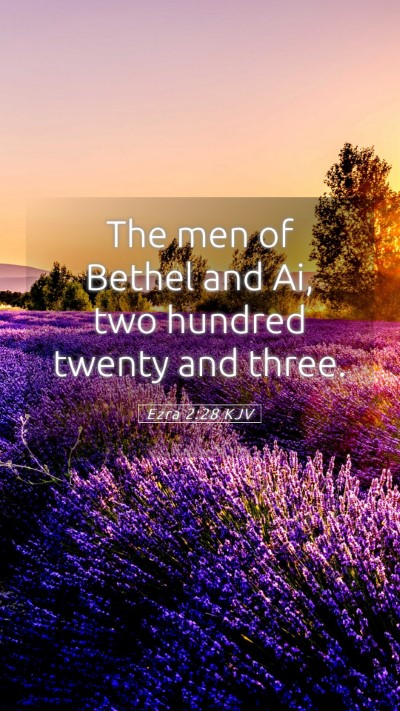Bible Verse Explanation: Ezra 2:28
Ezra 2:28 states: "The men of Beth-azmaveth, two hundred twenty and three."
This verse belongs to a larger enumeration of the returning exiles from Babylon to Jerusalem, as recorded in the book of Ezra. As we delve into the meaning and interpretations of this specific verse, we can gather insights from various public domain commentaries.
1. Context of the Verse
To understand this verse fully, it’s essential to appreciate the historical context. The return from Babylonian exile occurred after a prolonged period of captivity for the Israelites. Ezra’s list details the families and individuals who returned, signifying a rebirth for the Jewish people in their homeland.
- Historical Significance: This enumeration served to establish identity and legitimacy for the returning exiles as they sought to rebuild their community and worship practices in Jerusalem.
- Community Restoration: The specific mention of the "men of Beth-azmaveth" emphasizes the importance of each family and tribe in the restoration process.
2. Insights from Matthew Henry
Matthew Henry emphasizes the importance of precise counting and recognition of every individual who returned. He notes that such lists not only show God's faithfulness in bringing His people back home but also highlight the communal aspect of the restoration.
- God’s Providence: Henry points out that this return is a fulfillment of God’s promise and a manifestation of His providence, recognizing that every family contributed to the rebuilding of Israel.
- Faithful Remnant: The presence of these families illustrates that God preserves a remnant for Himself, showcasing His continual commitment to His covenant people.
3. Perspectives from Adam Clarke
Adam Clarke provides a detailed examination of the location and historical relevance of Beth-azmaveth. Clarke mentions that this name could reference a specific community within the territory of Benjamin.
- Geographical Context: Clarke stresses the importance of geographical identifiers as they relate to the heritage and tribal affiliations of the Israelites.
- Exile and Return: He emphasizes the idea of identity restoration as crucial for the community that underwent significant trials during the exile.
4. Albert Barnes’ Commentary
Albert Barnes underscores the significance of the numbers presented in this chapter. He states that the meticulous recording of names and numbers reflects a sense of order and God's care for His people.
- Divine Order: The structure of these listings indicates God's sovereign governance in the lives of His chosen people.
- Historical Record: The verse serves as a historical record not only for the time of Ezra but also for future generations to understand God’s plan of restoration.
5. Application of the Verse
For modern readers, Ezra 2:28 serves as a reminder of the importance of community and collective identity in faith. It calls for recognizing each individual’s contribution to the larger body of believers.
- Community Involvement: Just as the returning exiles came together to rebuild, so too should contemporary believers be involved in the life of the church.
- Recognizing God's Faithfulness: The verse encourages believers to reflect on God’s faithfulness throughout history and in their personal lives.
6. Cross References
This verse has direct connections to other biblical passages that speak about the return from exile and the importance of community:
- Nehemiah 7:6-73: A similar listing of individuals returning from exile.
- Ezra 1:1-4: The decree of Cyrus permitting the Israelites to return to Jerusalem.
- Jeremiah 29:10: God's promise to the exiles that they would return to Jerusalem after seventy years.
Conclusion
In summary, Ezra 2:28 might appear to be a simple enumeration, but through deeper scripture analysis and biblical commentary, we uncover themes of community, God’s providence, and restoration. Each name and number holds significance in the grand narrative of God’s faithfulness to His people. As we study this verse within the context of Ezra, we are reminded of the power of collective identity in our faith journeys and the constant call to recognize God’s work in our lives and communities.


